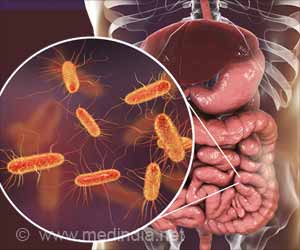Alterations in the gut microbiome could lead to obesity. This can be caused by disruption of the biological clock, recurrent weight gain or enhanced susceptibility to infections. Better understanding of the link between the gut microbiome and obesity can lead to the development of new therapies.
- Link between the dynamics of the gut microbiome and the occurrence of obesity in mice and humans has been studied
- Alterations in the gut microbiome can lead to obesity
- The altered gut microbiome dynamics are caused by three conditions, including (i) disruption of the biological clock, (ii) recurrent weight gain, and (iii) enhanced susceptibility to infections
- Establishment of this link can lead to the development of novel therapeutic strategies against obesity
- Disruption of the Biological Clock
- Recurrent Weight Gain
- Enhanced Susceptibility to Infections
Read More..
The research has been published in Science, the most prestigious journal of the American Association for the Advancement of Science (AAAS), the non-profit science society.
What is a Microbiome?
A microbiome is the sum total of all the genetic material within a microbiota. The microbiota is constituted by microorganisms occupying a particular ecological niche in the body, such as the gut microbiota. A variety of microbes may be present in a microbiota, including bacteria, fungi, and viruses. The human microbiome (all the microbial genes in the human body) is considered as a counterpart of the human genome (all the genes in the human body).The three conditions that affect gut microbiome dynamics and are linked to obesity are discussed below:
1. Disruption of the Biological Clock
There has been a dramatic change in lifestyle over the past century, which has resulted in an altered susceptibility to various metabolic diseases. The research suggests that this changed lifestyle has led to disruption of the biological clock, possibly due to alternate day/night work shifts that directly impacts metabolic health which, in turn, adversely affects the gut microbiome.
Previous studies have found a link between disruption of the biological clock in obese and diabetic patients. Thaiss found that the gut microbiome exhibits a 24-hour (circadian) rhythm in both mice and humans. He also discovered that the daily fluctuations in the gut microbiome impact the circadian rhythm of the host.
2. Recurrent Weight Gain
The disruption of the gut microbiome over longer time-periods showed that obese mice or humans who had reduced their weight, once again became obese. This recurrent fluctuation in weight loss and weight gain is known as the “Yo-Yo Effect”, a phenomenon which has long baffled scientists.
Thaiss found that when the mice or humans became obese, the gut microbiome was also altered, which persists for a long time, even after returning to normal weight. This “memory-like” long-lasting impression on the gut microbiome was responsible for the rebound weight-gain in the host, leading one again to obesity.
3. Enhanced Susceptibility to Infections
The enhanced susceptibility of obese and diabetic individuals to infections and systemic inflammation was also investigated. The wall of the gut has a lining of epithelial cells that normally acts as a selective barrier to the movement of molecules, including bacterial toxins, between the intestine and the blood.
Thaiss found that in diabetic and obese mice, this intestinal barrier was disrupted, which led to leakage of bacterial toxins into the blood circulation, thereby causing systemic infections and widespread inflammation. This observation was confirmed in a human diabetic cohort, where it was found that high blood glucose levels led to leaking of microbial products into the circulation.
“Since most of our work was carried out using mice to model obesity and its metabolic complications, the most important next step will be to translate our findings to human obesity. Our first insights indicate that the fundamental mechanisms we discovered can be applied to human biology. Whether our approach can be used to improve metabolic health in humans is an exciting question that we are actively pursuing,” said Thaiss.
In this regard, Valda Vinson, Deputy Editor of Science indicated that understanding the interplay between diseases like obesity and the gut microbiome could lead to new therapeutic interventions.
About the Prize
The Science & SciLifeLab Prize for Young Scientists is awarded to researchers who have done exemplary research in the area of Life Sciences. The Grand Prize of US$ 30,000 is awarded to the scientist, whose essay is adjudicated to be the best. Thaiss’ essay, entitled “Microbiome Dynamics in Obesity” was the best essay submitted this year. The award is supported by SciLifeLab (Science for Life Laboratory), a national center for advanced molecular life sciences in Sweden, the journal Science, and the Knut and Alice Wallenberg Foundation, which promotes scientific research, teaching and education and is the largest private funder of research in Sweden.Reference:
- Christoph Thaiss Wins 2018 Science & SciLifeLab Prize - (https://www.aaas.org/news/christoph-thaiss-wins-2018-science-scilifelab-prize)
Source-Medindia
















